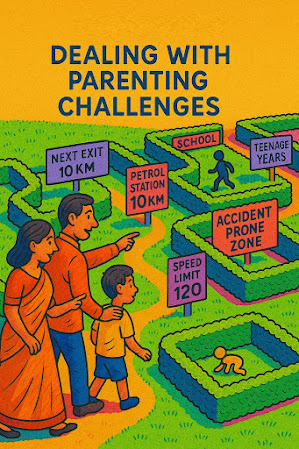6.7 Dealing with Parenting Challenges
Understanding That Parenting Is a Journey, Not a Destination
Parenting is a continuous process, not a one-time achievement. Many modern parents feel overwhelmed by the idea of being "perfect" at all times, influenced by social media ideals and societal expectations. However, seasoned elders often remind us that parenting is about evolution—making small improvements, learning from mistakes, and adapting to changes. A grandmother once shared, “There is no single rulebook. We all learned on the go—sometimes the hard way.” Understanding that challenges are an inevitable part of the process can reduce pressure and open up space for real growth.
Navigating the Digital Distractions
Today’s parenting comes with a set of digital complications—constant screen time, online games, social media peer pressure, and reduced face-to-face interaction. Unlike older generations who raised children with more physical activities and outdoor play, parents now must develop strategies to strike a balance. Many elders recommend setting screen-free family hours and involving kids in household activities. A grandfather pointed out, “In our days, responsibility kept us engaged. We didn’t need screens to occupy us.”
Balancing Discipline with Compassion
One major challenge for modern parents is maintaining discipline without appearing harsh or insensitive. With increasing awareness of child psychology, today’s generation leans toward gentle parenting, yet struggles with enforcing boundaries. Elders often suggest a balance—sternness when needed, but always with love. One mother recalled how her father’s strict bedtime rules shaped her punctuality. “He didn’t shout, but he made sure we followed through.” Setting rules with explanations, and following through consistently, builds long-term respect.
Handling Tantrums and Emotional Outbursts
Tantrums are inevitable, especially in early childhood. What’s changed is the tolerance and coping style of parents. While elders might have had less patience, they also had fewer external pressures and more community support. Parents today feel isolated and judged. A key insight is not to personalize tantrums. An experienced parent shared, “It’s a storm passing through. Stay calm, hold space, and let them learn emotional regulation.” Listening, hugging, or calmly distracting can make a bigger impact than reacting emotionally.
Resolving Sibling Rivalry with Fairness
Sibling rivalry has existed across generations. Elders often emphasize equal love but not necessarily equal treatment—because every child has unique needs. Modern parents may overcompensate to appear fair, which can sometimes create confusion. A wise elder once said, “Children don’t need identical gifts, they need equal time and attention.” Encouraging collaboration, assigning shared responsibilities, and celebrating each child’s uniqueness can turn rivalry into a lifelong bond.
Coping with Academic Pressures
Parents today often feel torn between encouraging their children to excel and not overwhelming them. With competitive education systems and performance-based culture, parenting becomes a source of silent stress. Earlier generations focused more on values, responsibility, and general knowledge than on marks. As one retired teacher explained, “Children must be allowed to enjoy learning, not fear it.” Open communication, realistic expectations, and focusing on effort rather than results can ease academic anxieties for both children and parents.
Parenting in Single or Nuclear Families
Unlike joint families of the past, many urban households now consist of single or nuclear parents, which comes with its own set of emotional and logistical challenges. Elders often stress the value of extended family support. A young single mother shared how staying connected with her parents helped bridge the emotional gap for her child. Even if physically distant, regular video calls with grandparents, or community bonding with trusted neighbors, can offer immense relief and guidance.
Managing Peer Influence and Social Comparison
Children today are more exposed to peer pressure than ever before—how they dress, what gadgets they use, and even what career paths they consider. Parents too feel social comparison from other parents, especially in digital circles. One father humorously admitted, “WhatsApp school groups are a full-time job!” Elders suggest grounding children with strong inner values, helping them understand needs vs. wants, and sharing personal stories of how they resisted peer pressure during their time.
When Children Disagree with You
It’s natural—and even healthy—for children to challenge parents as they grow. Many parents today find it hard to accept backtalk or arguments. But elders offer a different perspective: disagreement is not disrespect if handled properly. “When children asked questions, we saw it as curiosity,” shared one elderly parent. Rather than shutting them down, explaining the reasoning behind rules and discussing choices openly can foster mutual respect and long-term understanding.
Seeking Support Without Shame
Perhaps one of the biggest modern-day parenting challenges is feeling isolated in struggles—afraid to ask for help, fearing judgment. Elders grew up in more community-centric setups, where help was freely offered and taken. Today, support can still be found—through parenting groups, counselors, family elders, or even spiritual practices. Admitting challenges is not weakness; it’s a sign of conscious parenting. As one grandmother put it, “Even a tree needs support to grow straight. Why not a parent?”



